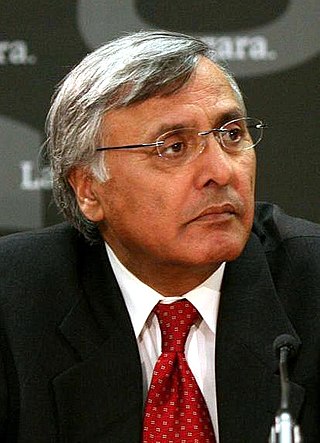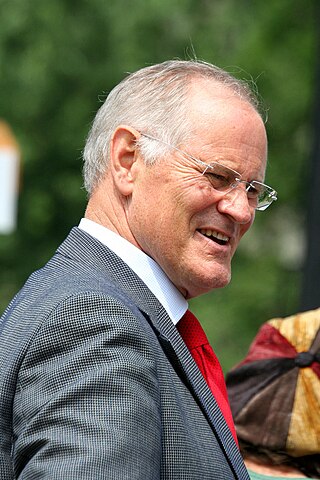Related Research Articles
Maher Arar is a telecommunications engineer with dual Syrian and Canadian citizenship who has resided in Canada since 1987.

Ujjal Dev Dosanjh, is a Canadian lawyer and politician. He served as the 33rd premier of British Columbia from 2000 to 2001 and as a Liberal Party of Canada member of Parliament from 2004 to 2011. He was minister of health from 2004 until 2006, when the party lost government. He then served in the Official Opposition from January 2006 until 2011. Dosanjh was one of four visible minorities to serve in Paul Martin's Ministry.

The Canadian Security Intelligence Service is Canada's main national intelligence agency. It is responsible for collecting, analysing, reporting and disseminating intelligence on threats to Canada's national security, and conducting operations, covert and overt, within Canada and abroad. The agency also reports to and advises the minister of public safety on national security issues and situations that threaten the security of the nation.
Firearms in Canada are federally regulated through the Firearms Act and related provisions of the Criminal Code. Regulation is largely about licensing and registration of firearms, including air guns with a muzzle velocity of more than 500 ft/s or 150 m/s and muzzle energy greater than 4.2 ft⋅lb or 5.7 J.

Richard Bennett Hatfield was a New Brunswick politician and the longest serving premier of New Brunswick from 1970 to 1987.

Marc Scott Emery is a Canadian cannabis rights activist, entrepreneur and politician. Often described as the "Prince of Pot", Emery has been a notable advocate of international cannabis policy reform, and has been active in multiple Canadian political parties at the provincial and federal levels. Emery has been jailed several times for his cannabis activism.

The trial of Louis Riel took place in Regina, Canada in 1885. Louis Riel had been a leader of a resistance movement by the Métis and First Nations people of western Canada against the Government of Canada in what is now the province of Saskatchewan. Known as the North-West Rebellion, this resistance was suppressed by the Canadian military, which led to Riel's surrender and trial for treason. The trial, which took place in July 1885 and lasted five days, resulted in a guilty verdict. He was also given a choice to plead guilty or insanity. Riel was subsequently executed by hanging, an outcome which has had a lasting negative impact on relations between Anglophone Canadians and the Riel supporters among French Canadians.

Abdullah Ahmed Said Khadr is a Canadian citizen whose alleged ties to terrorism resulted in a protracted international legal issue. Born in Canada, he grew up in Pakistan. As the oldest son of Ahmed Khadr, who had ties to the Afghani Mujahideen, Abdullah was sent to the Khalden military training camp as a boy. As a young adult, he allegedly became an arms dealer, selling illicit weapons to militants involved in the War in Afghanistan and related conflicts.

The criminal law of Canada is under the exclusive legislative jurisdiction of the Parliament of Canada. The power to enact criminal law is derived from section 91(27) of the Constitution Act, 1867. Most criminal laws have been codified in the Criminal Code, as well as the Controlled Drugs and Substances Act, Youth Criminal Justice Act and several other peripheral statutes.
The Public Prosecution Service of Canada was established on December 12, 2006, by the Director of Public Prosecutions Act. A federal agency, the PPSC prosecutes offences on behalf of the Government of Canada. It is responsible to Parliament through the attorney general of Canada, who litigates on behalf of the Crown and has delegated most prosecution functions to the PPSC.

R. v. Perka, [1984] 2 S.C.R. 232 is, along with R v Latimer, a leading Supreme Court of Canada decision on the criminal defence of necessity.
The Law Enforcement Action Partnership (LEAP), formerly Law Enforcement Against Prohibition, is a U.S.-based nonprofit organization group of current and former police, judges, prosecutors, and other criminal justice professionals who use their expertise to advance drug policy and criminal justice solutions that enhance public safety. The organization is modeled after Vietnam Veterans Against the War. As of April 2017

The Organized Crime Agency of British Columbia (OCABC) is a Designated Policing and Law Enforcement Unit under the Police Act (B.C.) established on March 11, 1999. Similar to the structure and authority of municipal police departments in British Columbia, OCABC is an independent policing agency. The specific mandate of the OCABC is to facilitate the disruption and suppression of organized crime.

William Carvel Graham was a Canadian lawyer, academic and politician. Graham served as the minister of foreign affairs, minister of national defence, leader of the opposition and interim leader of the Liberal Party of Canada. After leaving politics, he was the chancellor of Trinity College at the University of Toronto.
The Mayerthorpe tragedy occurred on March 3, 2005, on the farm of James Roszko, approximately 11 km (6.8 mi) north of Rochfort Bridge near the town of Mayerthorpe in the Canadian province of Alberta.

Robert Wilfred Paulson, is a former Commissioner of the Royal Canadian Mounted Police. He retired from the RCMP at the end of June 2017.

Bruce Allan Clark is a Canadian native rights lawyer, writer and activist. He rose to attention as part of the Gustafsen Lake Standoff and its aftermath.

The Cannabis Act (C-45) of June, 2018 paved the way for the legalization of cannabis in Canada on 17 October 2018. Police and prosecution services in all Canadian jurisdictions are currently capable of pursuing criminal charges for cannabis marketing without a licence issued by Health Canada. The Supreme Court of Canada has held that the federal Parliament has the power to criminalize the possession of cannabis and that doing so does not infringe upon the Canadian Charter of Rights and Freedoms. The Ontario Court of Appeal and the Superior Court of Ontario have, however, held that the absence of a statutory provision for medical marijuana is unconstitutional, and to that extent the federal law is of no force and/or effect if a prescription is obtained. The recreational use of cannabis has been legalized by the federal government, and took effect on 17 October 2018.

On December 1, 2018, Huawei's board deputy chair Meng Wanzhou was detained upon arrival at Vancouver International Airport by Canada Border Services Agency officers for questioning, which lasted three hours. The Royal Canadian Mounted Police subsequently arrested her on a provisional U.S. extradition request for fraud and conspiracy to commit fraud in order to circumvent U.S. sanctions against Iran. On January 28, 2019, the U.S. Department of Justice formally announced financial fraud charges against Meng. The first stage of the extradition hearing for Meng began Monday, January 20, 2020, and concluded on May 27, 2020, when the Supreme Court of British Columbia ordered the extradition to proceed.
References
- 1 2 "Download sound clip". Archived from the original (MP3) on 2011-07-16. Retrieved 2023-08-26.
- ↑ The Law Society of Upper Canada
- ↑ globeandmail.com
- ↑ National Post, "RCMP Chief backs off attack on grow-ops" March 08, 2005
- ↑ February 12, 1996
- ↑ Protais ZIGIRANYIRAZO